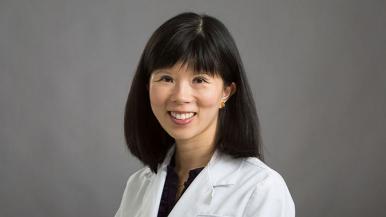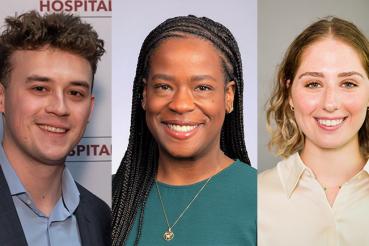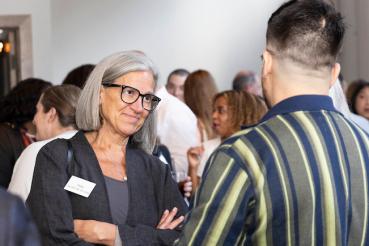The Rush Women Mentoring Program fosters professional development and a sense of community and collaboration among women faculty at Rush University. In this series, we highlight program mentors and mentees and learn more about how mentoring has impacted them.
Christine Tsai, MD, assistant professor in the Department of Internal Medicine, Rush Medical College, joined Rush in 2013.
Tell us about your background.
Christine Tsai: I grew up in the Chicago suburbs, earned my undergraduate degree at Harvard and attended Columbia University College of Physicians and Surgeons, where I completed my medical degree. I completed my internal medicine residency at Oregon Health and Science University in Portland. I came to Rush in 2013 and joined the Division of Hospital Medicine, where I have been ever since. Over the years, in addition to clinical work, I have pursued non-clinical medicine interests at Rush, including serving as the medical director of the attending and advanced practice provider directed services within Hospital Medicine; serving on the Department of Internal Medicine quality committee; and, more prominently, serving in Rush Medical College as a member of the admissions committee, as a faculty advisor to students and as co-director of the subinternship in internal medicine. Currently I am the practitioner role leader (director of clinical skills) at Rush Medical College and a clinician-educator for first- and second-year students, in addition to being a hospitalist.
What inspired you to get into your field?
CT: I was inspired by a desire to take care of patients during a time of illness and need when they are hospitalized; an interest in improving the quality of health care; and a commitment to teaching the next generation of physicians how to best diagnose, treat and care for patients.
What excites you about your work at Rush?
CT: There was a lot of teaching time among the resident services that were offered when I first started, and the community of colleagues at Rush is a group of very down-to-earth, warm, motivated people.
What is your opinion of mentoring and sponsorship?
CT: Mentoring is key to staying motivated and successful. Hearing from those who have been in your shoes before and can help you reach your goals is very valuable. Sponsorship is very helpful in experiencing new roles and finding areas of growth and leadership. I have received mentorship both officially and unofficially from many women in my division and outside of it. I have also been fortunate to have sponsors in both my division and department as well as at Rush Medical College who have given me opportunities that I had never dreamed. And I love them all!
Do you have tips or advice you would recommend for someone looking to enter your field of work?
CT: Get involved. Explore different opportunities and see what sticks and what excites you the most. You will likely volunteer your time first, and then, once you’ve built up a reputation, folks may start to buy out your time to do non-clinical work. I was once told, “The key to academic medicine is to get your time bought out to not see patients.” This was said in both in jest and in truth. We all love seeing patients, but we also want to contribute to the field in a larger capacity at an academic institution. Also, put yourself in your boss’s shoes when asking for anything. It’s not just about what your boss can do for you, but what you can bring to the table to support your group.
What are your hobbies? How do you like to spend your free time?
CT: I enjoy chasing my children around, being outdoors and cooking.




